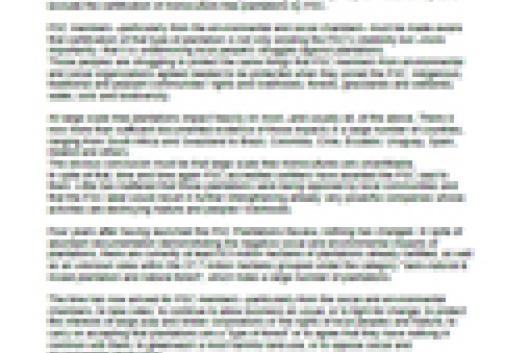Agrofuels have been presented as the solution to the climate crisis and as a "clean" alternative to fossil fuels. But in reality they are neither "green" nor environmentally friendly, no matter how international financial institutions (such as the World Bank and the Inter-American Development Bank, among others) and transnational corporations would like to promote them.
Stimulating the production of agriculturally-based fuels means that land will no longer be devoted to food production, and thus that people will be more dependent on large multinationals for their food. Vast expanses of land are covered by plantations where agrofuels will be grown; tropical rainforests are being destroyed to plant thousands of hectares with oil palms, sugar cane and other crops.
In Colombia, oil palm plantations in indigenous, peasant and Afro-Colombian communities have been established as a form of large-scale sharecropping, in which land is handed over so that it may benefit large landowners and businessmen. Such sharecropping constitutes a sort of agrarian counter-reform, in which peasant production is replaced by industrial monocropping that employs peasant and indigenous labor in a manner that exhibits characteristics of servitude. In many cases, palm plantations spread onto the lands of displaced communities.
Moreover, a model of "strategic alliances" has been established between small farmers and big businessmen (who control the entire chain of palm oil production, from cultivation to production, processing and marketing ), and which has resulted in indebtedness based on the sophistry of the "peasant economy of the palm." In reality, what these entrepreneurs are looking for is a permanent supply of raw materials, without having to be responsible for any labor relationship with peasants and small farmers, who rent their land and who often end up as laborers on these plantations, bearing all of the risk in the event of infestation, disease or other agricultural problems. Those who push for this type of agribusiness have used this deceptive strategy in dealing with farmers, creating the illusion that there will be a place for small farmers, but failing to say that they will be worse off.
The impacts identified above are only some of those that exist in Colombia. Based on them, however, we can point out the following:
WE REJECT
1. Initiatives like the Roundtable on Sustainable Palm Oil (RSPO), which is based on the false premise of establishing criteria for sustainability and giving a stamp of approval to palm plantations, in order to sell the product with social and environmental guarantees, thus seeking to legitimize a harmful business that infringes on the rights of indigenous, Afro-Colombian and peasant communities. At the same time as it seriously impacts lands and natural heritage through a strategy that seeks to facilitate the marketing of products derived from the oil palm, the RSPO generates only higher dividends, and not solutions to the conflicts that are created. In fact, no certification process can guarantee such solutions.
2. The government policies and the investors´ projects that are developing the palm oil production model, and which are, in many cases and in different parts of the country, accompanied by the violent expropriation of local communities´ lands.
3. Adjustments to the rural laws and policies of countries in the region that serve to implement principles and criteria which are guided solely by the logic of economic growth and profit, meaning a greater threat to national and territorial sovereignty.
4. The government policy that benefits private interests through enormous tax incentives that exclusively favor large corporations, at the expense of promoting the rural economy.
5. Disregard for the rights of landless or displaced peasant families, and in other cases, for the ancestral rights of the landowners originally from the area and of Afro-Colombian communities.
6. The policy of concentrating credit, which, hand in hand with the concentration of land ownership, promotes the displacement of thousands of farming families and the plundering of their means of subsistence.
WE ADVOCATE
Energy sovereignty and a rural policy that enables local communities to remain on their lands and which strengthens their traditional modes of production and their food sovereignty.
Recognition and respect for the rights of local communities to their lands and their heritage, as well as reparations for the victims of the agro-industrial model of oil palm production in the country.
A halt to the expansion of palm plantations and the processing of raw materials for agro fuels on the lands of local communities, since these fuels are intended to supply unsustainable markets and consumption, at the cost of the sacrifice of our heritage and our lands.
